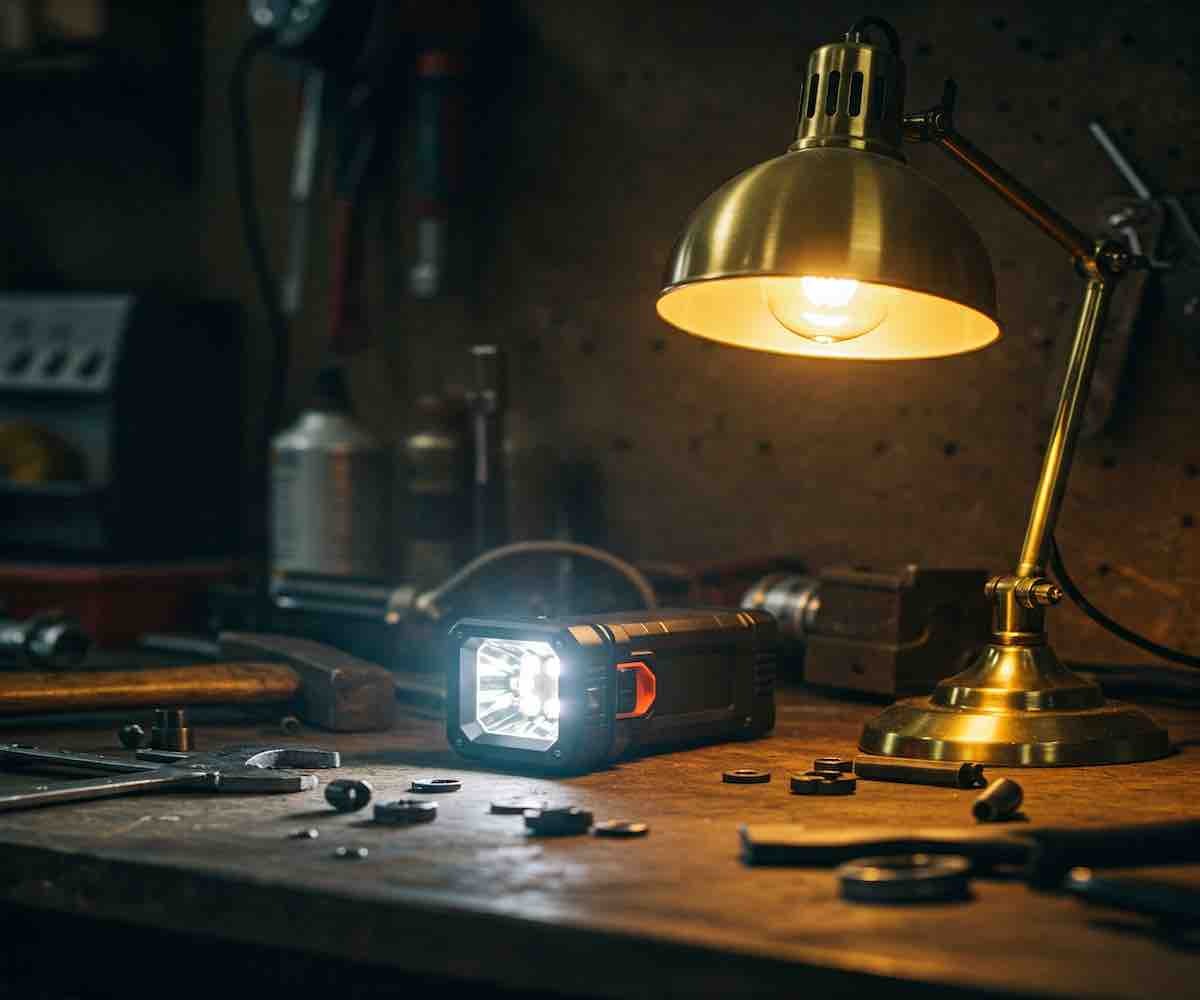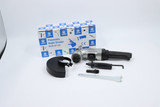Rechargeable Lighting vs. Corded Lighting: Which is Best for Your Workshop?
Proper lighting is crucial for any workshop, whether you're a seasoned mechanic, a dedicated DIYer, or a passionate hobbyist. But with the rise of rechargeable lighting solutions, the age-old question arises: corded or cordless? Both options offer distinct advantages and disadvantages, and choosing the best lighting for your workshop depends on your specific needs, work style, and budget.
This guide illuminates the key differences between rechargeable and corded lighting, exploring their pros and cons, highlighting top products, and providing expert insights to help you make an informed decision.
Rechargeable Lighting: Cordless Freedom and Portability
Rechargeable lighting has revolutionized the way we illuminate our workspaces. From compact work lights to powerful headlamps, these cordless wonders offer freedom of movement and portability that traditional corded lights simply can't match.

Pros:
-
No Cords, No Limits: Work without the constraints of cords getting tangled, snagged, or limiting your reach. This is especially beneficial in tight spaces, under vehicles, or on ladders.
-
Ultimate Portability: Easily move the light from one location to another, whether you're working on different projects, in various areas of your workshop, or on remote job sites.
-
Versatility: Rechargeable lights come in a wide array of forms, from compact pocket lights to powerful floodlights and headlamps, offering versatility for different tasks.
-
Emergency Lighting: Serve as a reliable backup light source during power outages.
-
Technological Advancements: Battery technology continues to improve, offering longer runtimes and faster charging times.
Cons:
-
Limited Runtime: Battery life can be a constraint, requiring recharging or battery replacements.
-
Initial Cost: Rechargeable lights often have a higher upfront cost than comparable corded options.
-
Battery Degradation: Over time, rechargeable batteries can lose their capacity, requiring eventual replacement.
-
Charging Time: Recharging batteries takes time, which can be inconvenient if you need continuous illumination.
Readers Like this article: Exploring the Pros and Cons of Rechargeable Light Bulbs
Corded Lighting: Consistent Power and Versatility
Corded lighting remains a reliable and versatile option for workshops, offering consistent power and a wide range of choices to suit different needs.
Pros:
-
Uninterrupted Power: Enjoy continuous illumination without worrying about battery life or recharging.
-
Cost-Effective: Corded lights generally have a lower upfront cost than rechargeable options.
-
Wide Variety: Choose from a vast selection of corded lights, including fluorescent tubes, LED shop lights, and specialized task lighting.
-
High Power Output: Corded lights can offer higher light output and brighter illumination than some rechargeable options.
Cons:
-
Limited Mobility: Cords restrict movement and can create tripping hazards.
-
Outlet Dependence: Requires access to power outlets, limiting placement options.
-
Cord Management: Cords can clutter your workspace and require careful management to prevent tangles and damage.
Top Rechargeable Lighting Options for Workshops
-
Maxxeon WorkStar® Series: These powerful and compact work lights offer impressive brightness, long runtimes, and durable construction. Maxxeon WorkStar® SeriesMaxxeon WorkStar® Series Buy from Online here

-
Rechargeable LED Work Lights: Explore a range of rechargeable work lights with different beam patterns, brightness levels, and features to suit your needs.
-
Rechargeable Headlamps: Enjoy hands-free illumination with comfortable and versatile headlamps for detailed work and inspections. [Link to relevant product category page]
Top Corded Lighting Options for Workshops
-
LED Shop Lights: Energy-efficient and long-lasting, LED shop lights provide bright, even illumination for your entire workspace.

-
Fluorescent Tube Lights: A cost-effective option for general workshop lighting, fluorescent tubes offer good light output and coverage.
-
Task Lighting: Choose specialized task lighting, such as adjustable arm lamps or magnifying lamps, for focused illumination on specific tasks. [
Readers Like this article Rechargeable Light Bulbs: Advantages and Limitations
Illuminate your workspace with the HYCHIKA 50W LED Work Light, a portable powerhouse delivering an impressive 5500 lumens of 5000K daylight. This IP65 waterproof flood light, complete with a sturdy stand, is designed for both indoor and outdoor use, making it ideal for car repairs, workshops, construction sites, and job sites. Its robust build and bright, energy-efficient LED ensure reliable lighting wherever you need it. As an Amazon Associate, I earn from qualifying purchases.
Making the Right Choice: Rechargeable vs. Corded
The best choice between rechargeable and corded lighting depends on your specific needs and preferences. Consider these factors:
-
Mobility: If you need freedom of movement and portability, rechargeable lighting is the clear winner.
-
Runtime: If you require continuous illumination for extended periods, corded lighting offers uninterrupted power.
-
Workspace: Assess your workspace layout and access to power outlets to determine the feasibility of corded lighting.
-
Budget: Balance your needs with your budget, considering the upfront cost and long-term value of each option.
-
Task Requirements: Choose lighting that provides the appropriate brightness and beam pattern for your specific tasks.
Key Takeaways
-
Rechargeable lighting offers cordless freedom, portability, and versatility, making it ideal for tasks requiring mobility and access to tight spaces.
-
Corded lighting provides consistent power and a wider range of options, making it suitable for general workshop illumination and tasks requiring high light output.
-
Consider factors like mobility, runtime, workspace, budget, and task requirements when choosing between rechargeable and corded lighting.
Illuminate your workspace with the best lighting solutions from Tend Supplies. Explore our wide selection of rechargeable and corded lights to find the perfect options for your workshop.
Related Resources:
-
Rechargeable Light Bulbs:Tend Industrial Rechargeable Light bulbs
-
Work Lights: Worklights you can find in Tend Industrial Supplies Online
Related Articles
How to Charge LED Work Lights: A Step-by-Step Guide
How Do Rechargeable Light Bulbs Work? A Technical Overview
Rechargeable vs. Corded Lighting FAQs: Your Burning Questions Answered
1. Are rechargeable lights as bright as corded lights?
Rechargeable lights can be just as bright as corded lights, especially with advancements in LED technology. However, some high-powered corded lights may offer greater light output.
2. How long do rechargeable batteries typically last in work lights?
Battery life varies depending on the light's brightness and battery capacity. Many rechargeable work lights offer several hours of runtime on a single charge.
3. What are the benefits of using LED lights in my workshop?
LED lights offer several advantages, including energy efficiency, long lifespan, durability, and bright, clear illumination.
4. Can I use a combination of rechargeable and corded lighting in my workshop?
Absolutely! Many workshops benefit from a combination of both types of lighting. You can use corded lights for general illumination and rechargeable lights for specific tasks or portable lighting needs.
5. What safety precautions should I take when using workshop lighting?
Always ensure proper wiring and grounding for corded lights. Avoid overloading circuits and use lights with appropriate voltage ratings. For rechargeable lights, follow the manufacturer's charging instructions and avoid exposing batteries to extreme temperatures.











